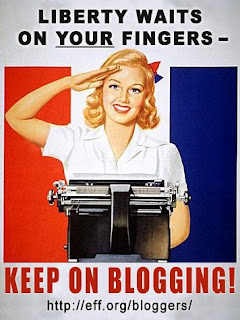
Public journalism, amateur journalism, citizen journalism, user generated content, call it what you want, the fact remains that journalism isn’t the sole preserve of journalists. It is in fact within anyone’s power to contribute to the wider public debate, and now with a bewildering array of tools available it has never been easier for Joe Bloggs to express his opinion to the World.
It is argued that citizen journalism is good for democracy, that by enabling the world and his wife to tell their story we are protecting
article 10 and the freedom of expression. Citizen journalism is a means of taking power away from dominant media organisations and giving it to us, the men and women on the
Clapham omnibus.
Through this democratisation of media outlets news reporting and production will come more of an integrated seminar, a round table discussion rather than the lectures that big news corporations have been providing. No longer will we be talked at, instead we will be talked to.
This, in my opinion, is all well and good in theory, however I do feel that in practice the phenomenon of UGC is not as relevant as the theorists would like to think.
Ofcom's recent report suggests that the take up of broadband and digital media has slowed recently and in certain working class areas access is limited at best. This would imply that the new media, which provides potential for an explosion of citizen journalism, is not being used by every strand of society. If therefore citizen journalism is the domain of the middle class and above is it the enabling factor that some perceive it to be?
I also feel that those who regularly spread their word over the
“inter-web” tend to be those who harbour extreme views, those who hold a grudge against someone or something, or those with time on their hands.
Whilst I also accept that video footage taken by ‘passers by’ is now being frequently used by news bulletins, the best footage of an incident or an event comes in my opinion from a talented or experienced cameraman. Take for example the footage of 9/11, I believe that the most poignant pictures were not those taken by a passing camera phone but those taken by professionals who happened to be at the scene at the time (like the
falling man for instance).
The moral of the story from my perspective is that whilst UGC holds the potential to be democratically enabling by letting us take a more active role in our news consumption, at this early stage it is merely the arena for issue campaigners, nutters and those who can.
Heres a nice video I found that gives a good overview of citizen journalism, it may help you make up your own mind. I for one however feel that only when every demographic gets in on the action can we truly call UGC a force for democracy.
Hwyl fawr
Image used Courtesy of Vaxzine @ http://www.flickr.com/photos/vaxzine/450074599




